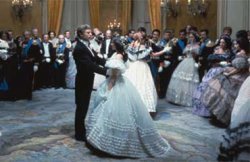 As it’s a fairly pricey three disc set, I’ve been holding off on getting the DVD of Lucino Visconti’s The Leopard (1963) from The Criterion Collection. But I found it this weekend at 20% off and I think that’s about as cheap as I’ll ever find it, so I finally picked it up.
As it’s a fairly pricey three disc set, I’ve been holding off on getting the DVD of Lucino Visconti’s The Leopard (1963) from The Criterion Collection. But I found it this weekend at 20% off and I think that’s about as cheap as I’ll ever find it, so I finally picked it up.So last night I watched it, the Italian version – not the dubbed American version which is also included, though from everything I’ve heard about that version I’m not sure why they bothered.
I think this is the first time I’ve seen it from start to finish. When I was younger, I saw it in bits and pieces on TV – both the Italian and American versions. It’s long and epic and elegiac. And it’s beautifully shot.
The film shows “… the tumultuous years of Italy’s Risorgimento – when the aristocracy lost its grip and the middle classes rose and formed a unified, democratic Italy.” It certainly does, but it does this through the eyes of Prince Don Fabrizio Salina (Burt Lancaster) and because it does the film has the elegiac quality I mentioned. The Prince is probably the only one who knows and understands what is happening. He realizes he is old now; his world has past so he sees the events that go on around him with somewhat tired, bemused eyes – tinged a bit with regret but accepting nonetheless.
Visually, Lancaster is perfect as the Prince. He has the stature and bearing, as well as the world-weariness necessary for the role. (Although Visconti wasn’t exactly thrilled to get Lancaster, “a cowboy.”)
 As the world is changing around him, the Prince sees someone will have to take his place. With not a great deal to choose from, he focuses on his nephew Tancredi (Alain Delon) as the best bet. The Prince also sees Tancredi will need to make a marriage that will provide him a fortune (as the Prince’s estate will be divided among all his children). This, he determines, should be the beautiful Angelica Sedara (Claudia Cardinale), daughter of Don Calogero Sedara, mayor of the town of Donnafugata. This would be a good marriage for the Prince’s family as the mayor, something of an oaf, has managed to become wealthy through land.
As the world is changing around him, the Prince sees someone will have to take his place. With not a great deal to choose from, he focuses on his nephew Tancredi (Alain Delon) as the best bet. The Prince also sees Tancredi will need to make a marriage that will provide him a fortune (as the Prince’s estate will be divided among all his children). This, he determines, should be the beautiful Angelica Sedara (Claudia Cardinale), daughter of Don Calogero Sedara, mayor of the town of Donnafugata. This would be a good marriage for the Prince’s family as the mayor, something of an oaf, has managed to become wealthy through land.The Prince, in other words, is trying to arrange his world (his family) for when he he is gone – and it won’t be the same world he has known.
And it’s this that is most fascinating about The Leopard. While the social change may be inevitable and necessary, something is also lost and we see what is being lost in some of the low comedy and the boorish manners of the classes that are rising. In the first part of the film where we see the violence of the rebellion, there is also a sense of comedy to it. The rebels win less because of their ability to defeat the soldiers they face than through sheer numbers and disorganization.
Perhaps Claudia Cardinale best captures the change Visconti wants to show. She’s stunningly beautiful and appears perfectly suited for the formality of the world she’s entering (the Prince’s aristocratic world of privilege). Later, we see her at the dining table chewing her bottom lip nervously. Later still, her elbow is on the table, her chin resting in her hand as she slumps over listening to Tancredi and others. While she has the look to capture everyone, she doesn’t have the social niceties.
The Leopard (Il Gattopardo):
- Amazon.com (U.S.)
- Amazon.ca (Canada)
Tag: Classic Film, Movie Classics, Movies, DVDs, Lucino Visconti
No comments:
Post a Comment